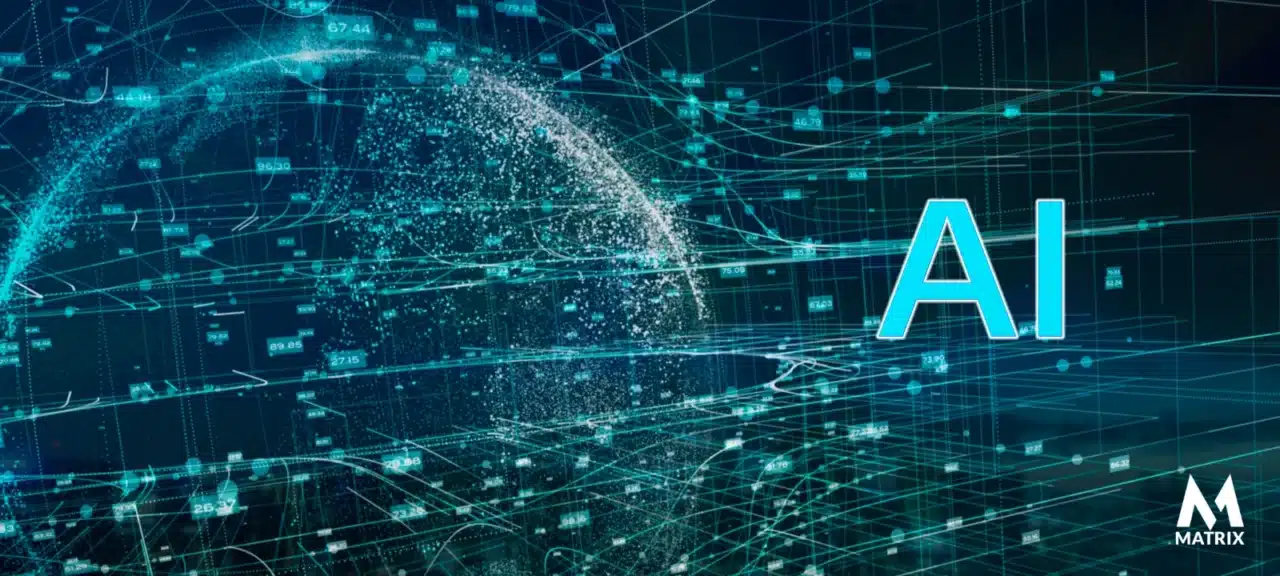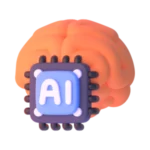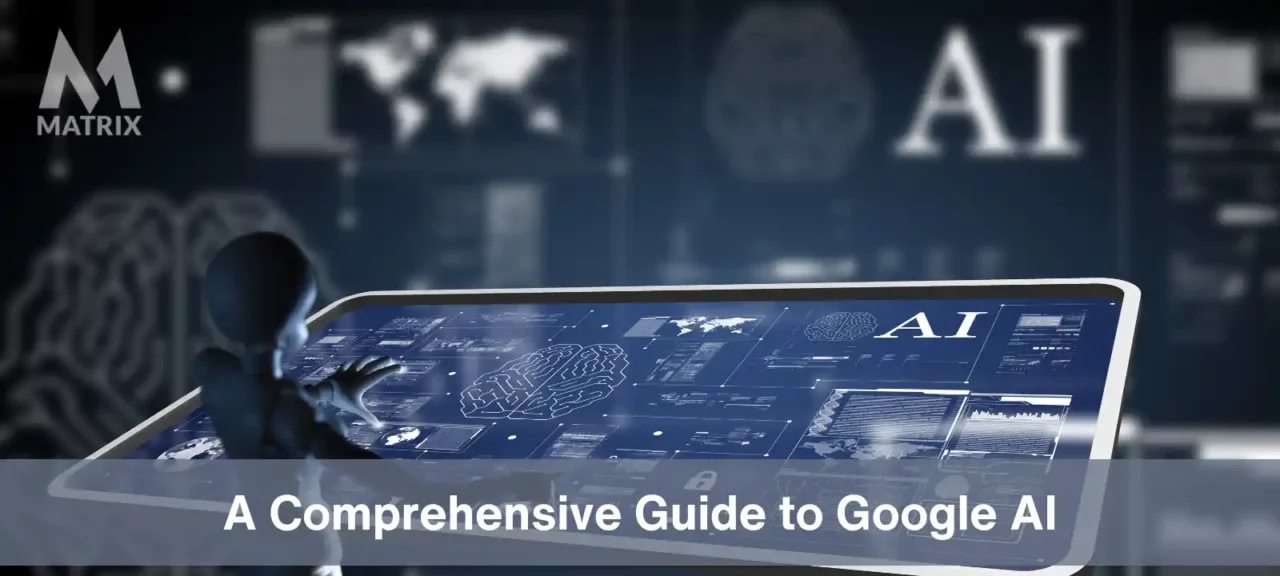A Comprehensive Guide to Google AI
Learn More About Google AI through this Guide to Google AI, including Vertex AI.
As a leader in your industry, you know the power of utilizing modern technology to serve customers better and develop superior products.
Google AI is making waves in the marketing world. It allows companies to access powerful insights and tools that make life easier for CEOs and business leaders.
In this comprehensive guide to Google Artificial Intelligence, we’ll explore how the company has revolutionized marketing by providing actionable data sets from machine learning models.
We’ll discuss why CEOs should consider investing in Google AI technologies when seeking an edge over their competition and explore what this cutting-edge tech can do for them—now and in the future.
I. Introduction to the comprehensive guide on Google Artificial Intelligence
Artificial intelligence is quickly becoming a buzzword in the world of technology. As our world continues to evolve and innovate, so does the concept of AI.
Google is at the forefront of this revolution, and they’ve recently released a comprehensive guide to AI. This guide is designed to help individuals navigate the complex world of Google’s AI tools.
From machine learning to natural language processing, this guide is a must-read for anyone looking to understand the latest developments in the field. So buckle up because we’re about to dive into the exciting world of Google Artificial Intelligence. Structured AI Outputs: Navigating the Future of Marketing
A. Definition and overview of AI

Artificial Intelligence, commonly called AI, is a computer’s ability to mimic human intelligence and decision-making. AI relies on complex algorithms and data to learn and adapt to new information and situations.
AI aims to create machines that can perform tasks that typically require human intelligence, such as visual perception, speech recognition, and decision-making. AI can transform numerous industries, including healthcare, finance, and transportation.
With AI, machines can process large amounts of data quickly and accurately, leading to increased efficiency and productivity. AI will undoubtedly become more advanced and integrated into our daily lives as technology evolves. Content Translation Services: A Competitive Advantage for Your Business
B. Brief history of AI
Artificial Intelligence, or AI for short, has come a long way since its inception in the mid-20th century. The concept was first coined in 1956 at Dartmouth College, where scientists gathered to explore the possibility of creating machines that could mimic human intelligence.
At the time, the dream of creating intelligent machines seemed like a far-off fantasy. However, technological advancements have enabled significant progress in AI in the following decades.
Today, AI powers everything from virtual assistants such as Siri and Alexa to self-driving cars and complex algorithms that can analyze vast amounts of data in seconds.
Looking back at the brief history of AI, it is truly remarkable to see how far we have come and how much further we can go in harnessing the power of intelligent tech.
C. Introduction to Google AI: Overview, history, and mission

Artificial intelligence has made remarkable strides in recent years, and Google has been at the forefront of its development. With its Google Artificial Intelligence program, the company continues to push the boundaries of what is possible with this exciting technology.
Google AI’s history dates back to the early 2000s when the company began exploring the potential of machine learning. Since then, Google AI has grown into a massive operation, with teams of researchers and engineers working to solve some of the most complex problems in the field.
Today, Google Artificial Intelligence’s mission is to “organize the world’s information and make it universally accessible and useful” by developing intelligent systems that process vast amounts of data and provide valuable insights. As we continue to explore the potential of AI, Google will undoubtedly remain a key player in the field. What is Neuro-Symbolic AI for Precision Marketing?
II. Understanding Artificial Intelligence
Artificial Intelligence, or AI, is a rapidly developing technology taking the world by storm. It refers to the ability of machines to perform cognitive tasks that would normally require human intelligence, such as learning, thinking, and problem-solving.
AI has significantly impacted various industries, from healthcare to finance to transportation. While some people worry about the loss of automation jobs, others are excited about the new opportunities that AI can create.
With its ability to analyze vast amounts of data and draw meaningful insights, AI is poised to revolutionize how we live and work.
As we continue to develop and refine this technology, it is important to consider both the incredible benefits it can bring and the potential challenges we must navigate to ensure that it is used ethically and responsibly.
A. Types of AI: Narrow, general, and superintelligence
Artificial Intelligence has come a long way since its inception.
Different types of AI have emerged as we have progressed in this field. These types are generally categorized into narrow, general, and superintelligence.
Narrow AI is the most commonly used type of AI, and it is mainly used to help machines perform specific tasks, like image recognition.
General AI, on the other hand, is designed to perform more complex tasks that require reasoning and intelligence, similar to humans.
At the same time, Superintelligence AI is an advanced technology that surpasses human intelligence. So, considering all factors, each type of AI has its own unique set of applications and abilities.
B. Key concepts in AI: Machine learning, deep learning, and neural networks

Artificial intelligence (AI) has recently become one of the most talked-about subjects. AI involves creating machines that can perform tasks that typically require human intelligence.
Machine learning, deep learning, and neural networks are the three key concepts that constitute the backbone of AI. Machine learning is training a machine to recognize patterns in large data sets.
On the other hand, deep learning involves creating multiple layers of neural networks to process complex data sets. Neural networks are algorithms that mimic how the human brain works by recognizing patterns through interconnected nodes.
These concepts have revolutionized how machines learn and have contributed to significant advancements in various fields such as healthcare, finance, and technology.
OrchestraAI Marketing Platform – WATCH
OrchestraAI utilizes a compound AI agent architecture as an AI Agentic Platform. This architecture seamlessly integrates multiple specialized AI agents into a cohesive system, enabling it to tackle complex, multifaceted marketing tasks.

III. Google Artificial Intelligence Technologies
Google AI Technologies represent a revolutionary shift in artificial intelligence, transforming how we approach problem-solving and data analysis.
With cutting-edge tools like TensorFlow and Cloud AutoML, Google is opening up a whole new world of possibilities for developers and businesses, empowering them to harness the immense power of machine learning.
By leveraging natural language processing, neural networks, and other advanced techniques, Google is helping users to streamline their processes and improve their bottom line.
Whether you’re looking to automate repetitive tasks, gain insights from big data, or develop innovative new products and services, Google Technologies is at the forefront of the AI revolution, unlocking infinite possibilities for the future.
Affordable SEO Solutions That Drive Real Results
Matrix Marketing Group Delivers Customized SEO Strategies with Transparent Pricing for Maximum ROI. See SEO Services.
A. Google Search AI
Google’s artificial intelligence system for search revolutionizes how we look for information online.
With its advanced natural language processing capabilities, the search AI can understand complex queries, long-tail keywords, and conversational language. This not only means that search results are more accurate and relevant, but it also makes searching feel more like conversing with an intelligent assistant.
The system constantly learns and improves, adapting to new trends, language changes, and user behavior changes. As a result, search is becoming more efficient and personalized for each user.
This exciting technology is just the beginning of what’s possible with AI in search and promises to improve our online experiences. Digital Marketing for Solar Companies to Increase Sales
B. Google Maps AI
Google Maps AI is changing the way we navigate our world. With its advanced algorithms and machine learning capabilities, the AI-powered system can provide personalized recommendations for everything from the best route to take to the most interesting points of interest to visit along the way.
This technology is revolutionizing the travel industry by giving users unprecedented detail and accuracy, empowering them to make informed decisions about their journeys.
Whether you’re a seasoned traveler or just looking to explore your city, Google Maps AI, like Vermont or New York, is the ultimate companion for navigating the world around you.
C. YouTube AI
YouTube has been making waves in the tech industry lately with its advancements in artificial intelligence. With its latest machine learning algorithms, YouTube has created an AI that can recognize patterns and make predictions based on the user’s viewing history.
This AI has already been implemented in the YouTube recommendation system, a key factor in attracting new viewers to content creators.
Not only is this technology impressive, but it’s also paving the way for even more advanced AI in the future. It’s exciting to see what YouTube’s AI team will come up with next.
Shifting from Lead Generation to Revenue Generation: A New Era for Marketing Managers
Unlocking 67% More Revenue: The Shift Every Marketing Manager Needs to Make
In today’s fast-paced digital landscape, marketing managers are bombarded with new strategies and tools claiming to revolutionize their approach. This statistic is not just a number—it’s a call to action for marketing leaders to reevaluate their strategies and realign their efforts with the bottom line. Schedule an appointment.

D. Google Assistant AI
Google Assistant AI has revolutionized the way we interact with our devices. Its advanced natural language processing capabilities enable us to conduct conversations with our phones, smart speakers, or other devices in a seamless and user-friendly way.
One of Google Assistant’s most impressive features is its ability to recognize and interpret multiple languages. This is made possible through its Output Language Code, a crucial part of the AI’s programming.
By understanding and translating speech across different languages, Google Assistant makes communication much easier, proving how powerful AI can enhance our daily lives.
E. Google Translate AI
Google Translate is the perfect tool for communicating with someone who speaks a different language. Thanks to artificial intelligence, It has become better than ever.
Google Translate’s new features and improved algorithms ensure more accurate and detailed translations. The Output Language Code, EN-US, is just one of the many language codes that Google Translate supports.
This feature is particularly useful for translating documents or texts from a foreign language into American English.
With Google Translate, language barriers are slowly breaking down, allowing people to communicate with each other seamlessly, regardless of the language they speak.
F. Google Photos AI
Google Photos AI is changing how we organize and track our photos. Thanks to its advanced artificial intelligence technology, the app can recognize and group pictures by people, places, and things, making it easier to find the photo you’re looking for quickly.
Moreover, Google Photos’ facial recognition capabilities allow it to automatically tag people in your photos, saving you the time and hassle of doing so manually.
With unlimited storage for your photos in the cloud, you can rest assured that your precious memories will always be safe and at your fingertips. With Google Photos AI, photo organization has never been so easy or efficient.
G. Google Cloud AI Services
Google Cloud AI services offer a cutting-edge platform for businesses and developers to create new, innovative solutions that use artificial intelligence and machine learning. From predictive analytics to image recognition and natural language processing, these powerful tools allow organizations to work smarter and more efficiently than ever.
Whether you’re looking to automate mundane tasks or build complex applications that can analyze vast amounts of data, Google Cloud AI is the ideal solution for anyone looking to take their business to the next level.
So if you’re interested in exploring this exciting technology’s benefits, why not try it today?
IV. Deep Dive into Google’s Key AI Projects
In today’s world, artificial intelligence is no longer a distant concept but a ubiquitous part of our daily lives.
Google, at the forefront of the AI revolution, has been developing cutting-edge projects that push the boundaries of what we thought was possible. Its key AI projects span a range of applications, from natural language processing to computer vision and healthcare.
These projects are paving the way for a smarter, more efficient future. By delving deep into Google’s AI projects, we can better understand the strides we are making in AI and its countless possibilities for the future.
A. DeepMind
In the world of artificial intelligence, DeepMind has emerged as a game-changer, revolutionizing the field and pushing the boundaries of what is possible.
Founded in 2010, this pioneering company is devoted to creating powerful algorithms to learn and adapt to new challenges with lightning speed and accuracy.
DeepMind has made major strides in natural language processing, computer vision, and manufacturing through groundbreaking research and sophisticated machine learning systems.
With a team of some of the brightest minds in AI, DeepMind is poised to continue making groundbreaking contributions to the field and shaping the future of technology in countless ways.

1. AlphaGo
AlphaGo is a revolutionary artificial intelligence program developed by Google DeepMind. Its main objective is to play the ancient Chinese board game Go against human players. The game is immensely complex, with more possible moves than atoms in the universe, making it a true test of a computer’s intelligence.
AlphaGo stunned the world by defeating one of its top human players in 2016, cementing its status as a groundbreaking technology. What makes AlphaGo particularly remarkable is its ability to learn and adapt.
Through constant practice and exposure to different playing styles, AlphaGo has improved its game and continues to challenge even the most skilled players. Its development has paved the way for future advancements in artificial intelligence and has revolutionized the field of computer science.
2. AlphaZero
In the world of artificial intelligence, AlphaZero has made a name for itself as a game-changing system.
Developed by Google-owned DeepMind Technologies in 2017, AlphaZero has mastered games such as chess, shogi, and Go, beating the best human players in the world. How does it do this? Unlike traditional AI systems that rely on pre-programmed rules, AlphaZero learns through self-play and deep neural networks. I love this.
It can create new, unconventional strategies to win games, making it a formidable opponent. AlphaZero’s innovations have endless potential applications, from optimizing supply chains to revolutionizing medical research.
As AI technology advances, AlphaZero is a shining example of the potential for self-learning systems to transform the world.
3. AlphaFold
AlphaFold is a game-changing technology that has revolutionized the field of protein folding. Developed by a team at Google’s DeepMind, it has disrupted the traditional methods of studying protein structures and opened up a new era of possibilities.
Using deep learning algorithms and advanced machine learning techniques, AlphaFold can predict the shape of a protein with incredible accuracy.
This breakthrough technology can potentially solve some of the biggest challenges in biochemistry and lead to the development of new life-saving drugs. In short, AlphaFold is one of our time’s most exciting scientific developments, and its impact will be felt for many years.
B. Google Brain

Google Brain is a revolutionary project in the world of artificial intelligence. The project is a deep learning initiative that aims to develop and improve intelligent computers that can learn and think like humans.
With the help of this technology, we can create intelligent machines that can analyze complex data and patterns, make predictions, understand natural language, and improve upon itself over time.
Google Brain has been used in various applications, such as voice recognition, image processing, and language translation. This technology’s potential is limitless, and it’s exciting to think about the future for artificial intelligence.
C. AutoML
AutoML, or Automated Machine Learning, revolutionizes how data scientists work with machine learning models.
It automates various stages of the machine-learning pipeline, including feature selection, algorithm selection, and hyperparameter tuning.
AutoML makes it easier for anyone, regardless of their technical background, to build an accurate and optimized model in a fraction of the time it would take manually.
This technology has democratized machine learning, making it faster, less costly, and more accessible. With AutoML, businesses can leverage AI’s power without investing in expensive data science teams. Thanks to AutoML, the future of machine learning is looking promising.
D. TensorFlow
TensorFlow is a powerful tool for those interested in machine learning and artificial intelligence. Developed by Google Brain Team, it has become one of the most popular software libraries for building deep learning models. Its flexibility and ease of use make it a top choice for researchers, developers, and data scientists.
TensorFlow can simplify complex computations and algorithms, helping your projects reach the next level. Its ever-expanding ecosystem of tools and functionality ensures that there is always something new to discover and learn.
Whether you are an experienced developer or just starting your journey in machine learning, TensorFlow has something for everyone.
E. Google Duplex
Google Duplex is an exciting technological advancement that has overtaken the world. What makes it unique is its natural-sounding human voice, which interacts seamlessly with users.
Using artificial intelligence, the language code EN-US, and a vast database of knowledge, Google Duplex can navigate complex conversations and perform tasks like making restaurant reservations or scheduling appointments on behalf of its users.
This exciting technology could revolutionize our interactions with businesses and services, saving us time and hassle. Duplex’s potential applications are limitless, and we can’t wait to see what other exciting features it offers.
V. Case Studies of Google AI Implementation
Google’s artificial intelligence (AI) implementation has been a game-changer in our interaction with technology.
Case studies of Google’s AI implementation provide invaluable insights into machine learning’s incredible potential and how it can transform industries. By harnessing AI’s power, Google has developed various cutting-edge solutions that help solve complex problems, from natural language processing to computer vision.
These case studies offer real-world examples of how AI can improve everything from customer service to business operations. The possibilities are endless, and it’s fascinating to see how Google continues to innovate and push the boundaries of what’s possible with this groundbreaking technology.
Google AI has a wide range of customers, including:
- Financial services: Google AI helps companies improve fraud detection, risk management, and customer service.
- Healthcare: Google AI helps companies develop new drugs and treatments, improve patient care, and reduce costs.
- Retail: Google AI helps retailers to personalize the shopping experience, optimize inventory, and fight fraud.
- Manufacturing: Google AI helps manufacturers to improve product quality, optimize production processes, and reduce costs.
- Media and entertainment: Google AI helps media and entertainment companies to create new content, personalize the user experience, and fight piracy.
- Government: Google AI helps governments to improve public safety, fight crime, and deliver better services to citizens.
Many startups and small businesses also use Google AI. These companies use Google AI to improve their products and services, grow their businesses, and compete with larger rivals.
Here are some specific examples of how customers are using Google AI:
- Apna: Apna is a professional marketplace that helps people find jobs in India. Apna uses Google AI to match job seekers with relevant opportunities and to provide personalized career advice.
- 20th Century Fox: 20th Century Fox uses Google AI to develop scripts, predict box office performance, and power long-term growth.
- Spotify: Spotify uses Google AI to personalize the music listening experience for its users.
- Lyft: Lyft uses Google AI to improve its ride-hailing service, including its safety features and ability to match riders with drivers.
- Walmart: Walmart uses Google AI to improve its supply chain, including its inventory management and ability to predict demand.
Google AI is constantly evolving, and new customers are adopting it daily. As Google AI continues to develop, it will have an even greater impact on businesses and organizations of all sizes. What is HubSpot Consulting?
A. Case study in healthcare

Healthcare is a constantly evolving field, requiring professionals to adapt to changes and remain up-to-date with the latest developments.
One way to do this is through case studies, which provide detailed insights into real-world scenarios and allow healthcare providers to develop practical solutions.
By examining patient cases and analyzing data, practitioners can identify patterns and trends that can help inform their decision-making processes.
Whether diagnosing a rare illness, developing an innovative treatment plan, or simply improving patient outcomes, case studies are invaluable tools for healthcare professionals seeking to enhance their expertise and keep pace with the ever-changing landscape of modern medicine.
B. Case study in manufacturing
Manufacturing is a complex process that requires precision and attention to detail. A case study in manufacturing can provide valuable insights into the challenges faced by businesses in this industry and the strategies employed to overcome them.
Companies can take many approaches to improving their efficiency and profitability, from optimizing supply chains to implementing advanced automation technologies.
By examining real-world examples of successful manufacturing operations, we can better understand what it takes to succeed in this competitive and ever-changing field.
Whether you’re an industry veteran or a newcomer looking to break into the manufacturing sector, a case study in manufacturing can provide valuable lessons and inspiration for your business endeavors.
C. Case study in logistics and operations

Logistics and operations are among the most complex and challenging business areas. The movement of goods, inventory management, and supply chain optimization require intricate planning and organization.
A case study in this field could provide invaluable insights into the strategies and tactics used by successful companies in this space.
By analyzing successful logistics and operations companies’ decision-making processes, resource allocation, and performance metrics, we can learn how to optimize our operations and deliver better customer value.
Overall, the logistics and operations field is fascinating in its complexity and offers a wealth of insights for those willing to study it in depth.
D. Case study in customer service
Customer service is essential to any business, and a case study on exemplary customer service can offer valuable insights. If you implement AI into your customer service support centers, you get up to an 80% realized gain in productivity and customer satisfaction.
An interesting case study is that of a company that elevates customer service beyond the norm. They prioritize meeting every customer’s needs with utmost care and attention. They take the time to listen to customers’ questions and concerns, offering personalized solutions and proactive communication throughout the process.
By investing in comprehensive training and providing a positive work culture, this company has created a customer-centric approach that has increased customer loyalty, retention, and referrals.
A successful customer service strategy can be a game-changer for any business, and this case study is a testament to the results that can be achieved when given the attention it deserves.
E. Case study in AI marketing
Artificial intelligence has brought about a paradigm shift in marketing, enabling companies to gain profound insights into their customers. This transformational technology has allowed businesses to understand their audience like never before, thus helping them keep up with the ever-evolving market trends while making informed decisions.
A fascinating case study in AI marketing comes from Spotify. The music streaming giant uses AI algorithms to analyze listeners’ habits, like their preferred genres and favorite artists, to produce personalized playlists.
This approach helps users discover new music and keeps them engaged with the platform, increasing retention rates.
AI also assists in targeted advertising, ensuring that users only see advertisements related to their interests. Suffice it to say Spotify’s approach to AI marketing has paid off, with a loyal following of music enthusiasts worldwide.
VI. Google Artificial Intelligence Ethics
As technology and artificial intelligence continue to advance, it is important to consider the ethical implications of such progress. Google, one of the world’s leading tech companies, has established an AI ethics board to address these concerns. MatrixLabX practices ethical AI by sharing responsibility with Google.
This board, comprised of experts from various fields, guides Google’s development of AI technologies, ensuring they are created and used ethically with considerations for safety, fairness, transparency, and more.
Through this initiative, Google hopes to set a standard for responsible AI development and inspire other companies to do the same.
A. Overview of AI ethics
With advancements in artificial intelligence (AI) comes a new set of ethical considerations that must be addressed.
AI ethics encompasses the moral, social, and even legal implications of creating machines exhibiting cognitive abilities such as learning, reasoning, and decision-making.
These machines can directly impact our lives, from influencing healthcare decisions to shaping financial institutions. Establishing guidelines and principles that ensure these machines are designed, developed, and deployed responsibly, inclusively, and trustworthy is crucial.
AI ethics constantly evolve as technology advances, and it is up to us to examine the potential risks and benefits of these new developments to create a better future for all.
B. Google’s AI principles
Google made a significant announcement that it will introduce its AI principles to guide the development and deployment of its artificial intelligence technologies. The five-point principle encompasses the pursuit of beneficial AI, the avoidance of harm, privacy protection, ensuring accountability, and being socially responsible.
The principles aim to provide ethics and regulations for developing complex technologies to support society’s needs. By doing this, Google shows a responsible approach to AI, ensuring that its technology is designed and developed with a conscience, which is vital to ensuring safe and transparent AI practices.
By implementing these principles, Google hopes to build trustworthy AI and promote technology development for good.
C. Controversies and criticisms
Controversies and criticisms are inevitable in any field, and the business world is no exception. Companies and leaders have faced criticism for many reasons, from unethical practices to controversial decisions. While some controversies are minor blips on the radar, others have had long-lasting repercussions and damaged reputations. However, it’s important to remember that controversy can lead to change and progress. It encourages organizations to reflect on their actions and make necessary improvements.
Leaders can earn back trust and credibility by addressing criticisms and taking responsibility for mistakes.
Ultimately, handling controversies transparently and ethically is key to maintaining a positive reputation in the business world.
D. Ongoing efforts in responsible AI
In the rapidly evolving field of artificial intelligence, the ethical implications of technology have become a major concern for researchers and policymakers alike.
As AI becomes more prevalent in our daily lives, ensuring that it’s developed ethically and responsibly is becoming increasingly important.
To address these issues, institutions and researchers worldwide are making ongoing efforts in responsible AI. These efforts aim to ensure that AI is developed to maximize its benefits while minimizing its harms.
This involves everything from developing ethical guidelines for AI developers to creating new technologies to help mitigate AI risks.
While there is still much work to be done in this area, ongoing efforts in responsible AI represent an important step toward a more ethical and responsible use of this powerful new technology.
VII. Future of Google AI
Google AI is undoubtedly one of the most impactful technologies of our time, and its future holds incredible promise.
With new advancements in machine learning and natural language processing, Google AI can expect to become even smarter, more efficient, and more effective at processing and analyzing data.
One of the most exciting aspects of Google AI’s future is its potential to revolutionize our lives and work.
The possibilities are endless, from self-driving cars to automated healthcare and personalized education. As we continue to push the boundaries of what is possible with artificial intelligence, Google AI will undoubtedly play a leading role in shaping the future of our society.
A. Upcoming projects and focus areas
As we look to the future, several exciting projects are in the pipeline, and we have new focus areas that will keep us busy.
We constantly strive to innovate and improve our products and services to serve our customers better.
r upcoming projects range from new software releases to completely new product lines, and we are committed to ensuring that each project meets the high standards our customers have come to expect from us.
Additionally, we are expanding our focus to include sustainability, diversity, and social responsibility. We believe that by taking a holistic approach to our business, we can create lasting value for our customers and the wider community.
B. The role of quantum computing in Google’s AI
Google Quantum AI has emerged as a game-changing technology in computing, and unsurprisingly, Google is at the forefront of this technological revolution.
The integration of quantum computing with artificial intelligence has the potential to unlock unprecedented advances in fields such as machine learning, natural language processing, and computer vision.
And Google, with its cutting-edge research and development, has been making remarkable strides in this area.
By harnessing the power of quantum computing, Google’s AI can process complex data at an incredible speed, paving the way for newer and more efficient applications that were previously thought impossible. It’s truly an exciting time for technological innovation!
C. Potential societal impact of Google’s AI advancements
Google’s AI advancements have the potential to make a significant impact on society in numerous areas. One potential area where this technology could be powerful is in healthcare.
Medical professionals could use AI algorithms to identify patterns and diagnose diseases more accurately and efficiently, potentially saving lives.
Additionally, AI could help improve the education system by creating personalized learning plans for students based on their strengths and weaknesses.
However, while the potential benefits of Google’s AI advancements are vast, there are also concerns about potential negative impacts, such as job displacement and privacy concerns.
As this technology continues to evolve, society must carefully consider how it should be implemented and regulated to ensure its responsible and beneficial use.
VIII. How to Get Involved with Google AI and MatrixAI
Google AI and MatrixAI are quickly becoming some of the most exciting fields. If you’re interested in learning more, there are a few key ways that you can start to get involved.
One great option is to attend conferences or events focused on AI, as these can be a great way to network and learn from other experts in the field. You can also take online courses or tutorials to help you learn the basics of AI or even explore open-source AI platforms like TensorFlow or PyTorch.
Consider connecting with other AI enthusiasts on social media or online forums, where you can share ideas and collaborate on projects. With so many ways to get involved, there’s no reason not to take the plunge and start exploring this exciting field today!
A. Learning resources for AI from Google
Artificial intelligence is becoming increasingly important, and Google is paving the way with amazing resources for those eager to learn more.
With Google’s extensive experience in the field, it’s no surprise that they have some of the best learning materials available. From video tutorials to hands-on projects, Google provides a range of resources that cater to different learning styles and levels of expertise.
Whether you’re a seasoned pro or just starting, these AI learning resources from Google will help you take your skills to the next level. From machine learning to deep learning, you’ll find everything you need to know in one convenient place.
So why not take advantage of these resources today and take your first step toward becoming an AI expert?
Shifting from Lead Generation to Revenue Generation: A New Era for Marketing Managers
Unlocking 67% More Revenue: The Shift Every Marketing Manager Needs to Make
In today’s fast-paced digital landscape, marketing managers are bombarded with new strategies and tools claiming to revolutionize their approach. This statistic is not just a number—it’s a call to action for marketing leaders to reevaluate their strategies and realign their efforts with the bottom line. Schedule an appointment.

B. Careers in Google AI
With artificial intelligence’s ever-increasing importance in our world, it’s no wonder that careers in Google AI or MatrixLabX are becoming highly sought after.
Google AI offers many opportunities for those passionate about technology and innovation, from data analysts to engineers.
Whether you’re interested in building machine learning models or designing algorithms, there’s a place for you within the Google AI team. Plus, with the company’s commitment to fostering an inclusive and diverse workplace culture, you’ll join a team that values collaboration and creativity.
So why not explore a career with Google AI? Your next big opportunity to make a difference could be just around the corner.

C. Google AI Residency Program
The Google AI Residency Program is at the forefront of shaping the future of artificial intelligence. This unique program provides an opportunity for individuals passionate about AI to work alongside some of the most brilliant minds in the field.
Through this residency program, participants can gain hands-on experience with cutting-edge technology, broadening their skill sets and paving the way for exciting career opportunities.
With a commitment to diversity and inclusivity, Google AI is focused on creating AI solutions that will benefit people and communities worldwide.
The Google AI Residency Program is instrumental in advancing this mission and is a vital part of the ever-evolving field of AI.
D. Google AI Impact Challenge
Google’s AI Impact Challenge is paving the way for innovative solutions to some of the world’s toughest problems.
This competition focuses on using technology to improve people’s lives and seeks to support non-profit organizations and social enterprises making a real-world impact with AI.
The challenge encourages organizations to think big and creatively when incorporating AI into their operations. Seeing AI’s potential in healthcare, education, and environmental conservation is exciting.
This initiative has sparked great interest within the global tech community and will inspire meaningful change for years.
IX. Conclusion Google AI
In conclusion, Google AI has revolutionized the world of artificial intelligence. Its cutting-edge technologies have allowed businesses, researchers, and individuals to explore new possibilities in machine learning and natural language processing.
Google AI has made our lives easier and more efficient, from self-driving cars to virtual assistants. However, the journey toward realizing AI’s full potential is far from over. Google continues to invest heavily in research and development to push the boundaries of what we thought was possible.
With advancements in areas like deep learning and neural networks, the world of AI is exciting, and Google is leading the way.
A. Recap of key points on Google AI
Google AI has been making strides in artificial intelligence, and some key points are worth recapping.
For starters, Google AI has created advanced learning algorithms that allow machines to learn and perform tasks at a remarkable speed.
Additionally, Google AI has made significant progress in natural language processing, which has positive implications for voice assistants and language translation. Perhaps one of the most exciting developments from Google AI has been the creation of AlphaGo, a machine learning program that can play the ancient Chinese game of Go.
All of these advancements represent significant progress in AI and provide hope for continued innovation in the future.
B. Future of AI and Google’s Role in it
The future of AI is a hot topic today, and Google is undoubtedly one of the biggest players in Artificial Intelligence. With its powerful algorithms and vast amounts of data, Google has made significant strides in natural language processing and computer vision.
As AI continues to evolve and become more advanced, experts predict that it will become an even more integral part of our lives, and Google is poised to be at the forefront of this innovation.
From self-driving cars to smarter voice assistants, the possibilities for AI are endless, and it’s exciting to think about what the future holds. And with Google leading the charge, we can be sure we’re in good hands.
C. Google AI Marketing products
Google AI Marketing products are revolutionizing the marketing field, offering businesses powerful tools for optimizing advertising strategies.
With sophisticated technology that can analyze complex data sets and algorithms capable of generating targeted audience insights, these products are helping businesses achieve unprecedented success in their marketing campaigns.
From smart bidding in Google Ads to personalized product recommendations on Google Shopping, Google AI Marketing products are giving businesses the competitive edge they need to stand out in today’s crowded marketplace.
Whether you’re a small business owner or a marketing professional at a large corporation, the insights provided by these products can help you make more informed decisions about what strategies to pursue and how to allocate your advertising budgets.
Conclusion

Google AI has opened the door to even more possibilities in marketing when used correctly. From our Comprehensive Guide of Google AI with an emphasis on marketing, we’ve explored how Google’s suite of artificial intelligence technology and services, from search results to photos and cloud storage, can be used by businesses looking to market their products or services.
We’ve revealed the endless opportunities available, from being able to optimize content for each touchpoint, leveraging this data for personalized marketing strategies, and driving greater performance through effective tactics specifically designed for AI-driven content marketing.
Utilizing Google AI is a promising opportunity that all marketers should explore. As a leader in AI content marketing, let us show you how to leverage AI content marketing – and guarantee success with your digital business strategy.
Affordable SEO Solutions That Drive Real Results
Matrix Marketing Group Delivers Customized SEO Strategies with Transparent Pricing for Maximum ROI. See SEO Services.
General FAQs
How does Google AI help marketers target and segment?

Google AI uses machine learning algorithms to analyze large amounts of data and identify patterns and trends. This allows marketers to segment their target audience more accurately based on their behaviors, interests, and demographic characteristics. Furthermore, AI can predict future consumer behavior, enabling marketers to anticipate their audience’s needs and preferences for more effective targeting.
How does Google AI aid in content creation and personalization for marketing purposes?

AI technology like Natural Language Processing (NLP), a feature of Google AI, can analyze users’ online activity to understand their preferences. This allows for developing tailored content, leading to more captivating and impactful marketing campaigns. In addition, tools like Google’s Smart Compose and Smart Reply use AI to assist in writing effective and personalized email responses, enhancing customer communication.
Can Google AI improve the performance of digital advertising campaigns?

Google AI can optimize digital advertising campaigns in real-time. By leveraging machine learning, it becomes possible to adjust bids, pinpoint successful keywords, and optimize ad placements. Businesses can enhance visibility and bolster their conversion rates. Google’s AI can also perform A/B testing at a much larger scale and speed, determining the most effective strategies and techniques for a particular marketing campaign.
How does Google AI help marketers analyze and interpret data?

Google AI, particularly through its Google Analytics platform, can process and analyze vast amounts of marketing data quickly and accurately. It can identify trends, measure campaign performance, and provide insights that would be difficult and time-consuming to obtain manually. This enables marketers to make data-driven decisions more efficiently and accurately, improving their marketing strategies and campaigns.


